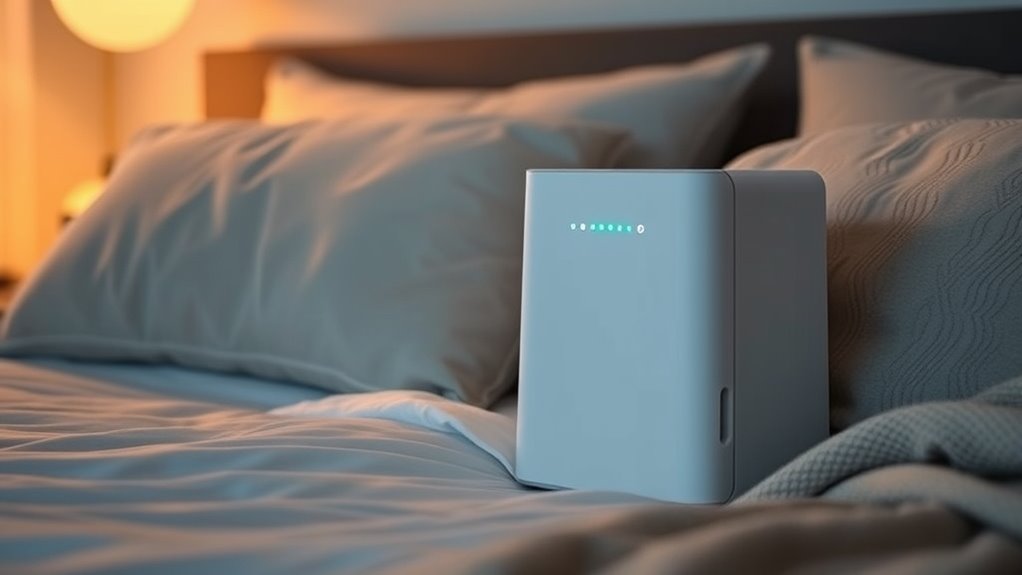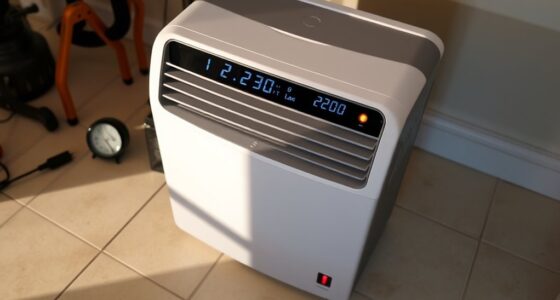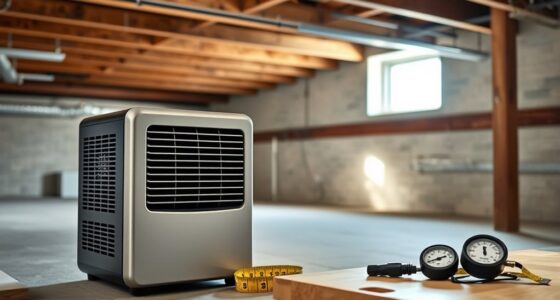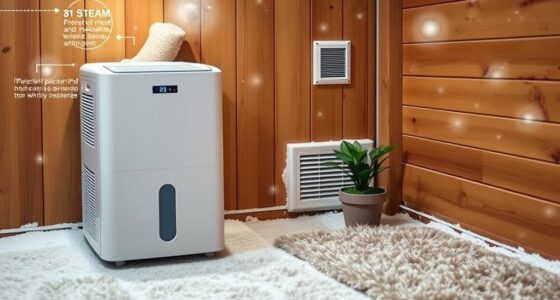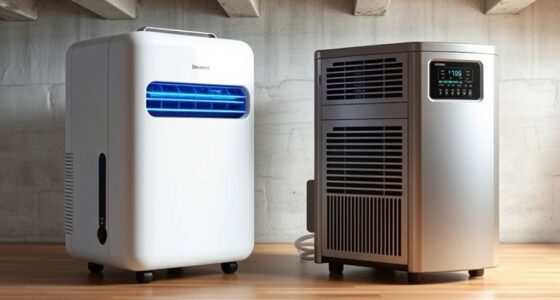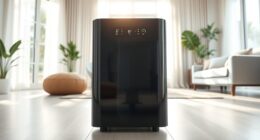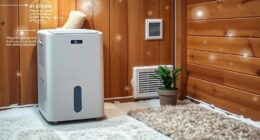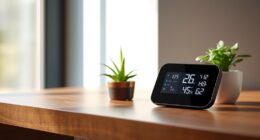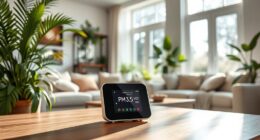To find the quietest dehumidifiers that won’t disturb your sleep, look for models with a decibel rating of 40 dB or less. Choose units with advanced sound-dampening features, vibration reduction, and adjustable fan speeds. Proper placement on vibration pads or away from your sleeping area also helps minimize noise. By combining the right technology and placement tips, you can enjoy a comfortable, moisture-free environment without sacrificing restful sleep—more details await you.
Key Takeaways
- Look for dehumidifiers with noise levels of 40 dB or less for minimal sleep disturbance.
- Choose models with advanced sound-dampening features and vibration reduction technology.
- Position the unit away from sleeping areas and on soft surfaces using anti-vibration pads.
- Utilize adjustable fan speeds and timers to operate the dehumidifier quietly during sleep hours.
- Prioritize smart controls and insulated housing for optimized quiet operation.
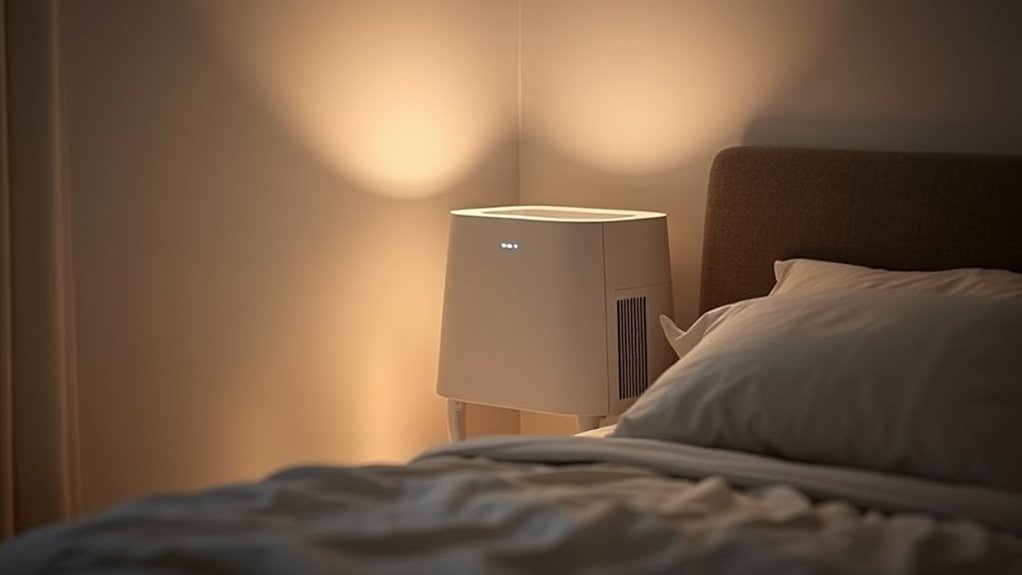
If you’re looking to improve your home’s humidity without sacrificing sleep quality, choosing the right dehumidifier is essential. One of the most important factors to think about is noise levels. Noisy appliances can disrupt your sleep, leaving you tired and groggy the next day. Luckily, many modern dehumidifiers are designed with quiet operation in mind, allowing you to maintain a comfortable, healthy environment without disturbance. When shopping for a unit, pay attention to the decibel ratings—models that operate around 40 decibels or less are generally considered quiet enough for sleeping areas. These devices use advanced fan controls, sound-dampening materials, and optimized airflow paths to minimize noise.
The quietest dehumidifiers often feature innovative technology such as low-noise compressors and vibration reduction systems. These features help guarantee that the hum of the machine remains subtle and unobtrusive. Additionally, some models have smart design elements like insulated housing or sound shields, which further dampen operational sounds. You’ll find that high-quality units also include adjustable fan speeds, allowing you to set them to a lower, quieter setting during the night. This way, you can keep humidity levels in check without waking up or disturbing your partner.
Another aspect to think about is placement. Positioning your dehumidifier away from your sleeping area or on a different wall can substantially reduce any residual noise. Many users report that placing the unit on a soft, non-vibrating surface or using anti-vibration pads can make a noticeable difference in noise reduction. If you want to make sure minimal disruption, look for models with automatic shut-off features or timers that can help you run the device during times when noise isn’t an issue, such as during the day or early evening.
Frequently Asked Questions
How Do Quiet Dehumidifiers Compare in Energy Efficiency?
When comparing quiet dehumidifiers, you’ll notice that lower noise levels often mean slightly higher energy consumption, but the difference is minimal. These units are designed to balance efficiency and sound, so you won’t sacrifice much on energy use. Look for models with energy-saving features like auto shut-off or adjustable humidity settings. Overall, quiet dehumidifiers provide effective moisture control without causing a disturbance, all while maintaining reasonable energy efficiency.
Are Quiet Dehumidifiers Suitable for Small Bedrooms?
Imagine a peaceful night where gentle whispers of a dehumidifier blend seamlessly into your sleep, not disrupting your dreams. Quiet dehumidifiers are perfect for small bedrooms because their low noise levels help maintain your sleep quality. You won’t wake up to loud vibrations or buzzing sounds. Instead, you get a comfortable, moisture-free environment that promotes restful sleep without sacrificing tranquility or quiet comfort.
Do Quiet Models Require More Maintenance?
Quiet dehumidifiers typically don’t require more maintenance than louder models. Their low noise levels often come from efficient components that operate smoothly, reducing wear and tear. You might find that maintenance frequency stays consistent regardless of noise level—just empty the water tank and clean filters as recommended. In fact, quieter models can sometimes be easier to maintain because they often have fewer moving parts or simpler designs.
Can Quiet Dehumidifiers Effectively Remove Excess Humidity?
Yes, quiet dehumidifiers can effectively remove excess humidity while maintaining low noise levels. Their sound insulation features reduce operational noise, making them suitable for bedrooms or quiet spaces. These models use advanced technology to balance power and quietness, so you won’t compromise performance for peace and quiet. Rest assured, you’ll keep your environment comfortable and dry without disturbing your sleep or daily activities.
Are There Specific Brands Known for Ultra-Quiet Operation?
Like a knight in shining armor, certain brands stand out for ultra-quiet dehumidifiers. You’ll want to focus on noise levels and brand reputation when choosing. Brands like Frigidaire, Honeywell, and Eva-dry are known for their quiet operation, ensuring your sleep isn’t disturbed. These brands use advanced technology to minimize noise, so you can rest peacefully while managing humidity. Trust reputable brands for the best quiet dehumidifier experience.
Conclusion
Imagine slipping into bed as a gentle hum lulls you into peaceful sleep, the dehumidifier’s quiet operation blending seamlessly into the night. With the right tech, your bedroom becomes a sanctuary—calm, cool, and undisturbed. No clattering or buzzing to break your rest, just a soft, steady whisper that keeps moisture at bay. Rest easy knowing you’ve chosen a dehumidifier that works silently, so you wake refreshed, your dreams unbroken by any noise.
